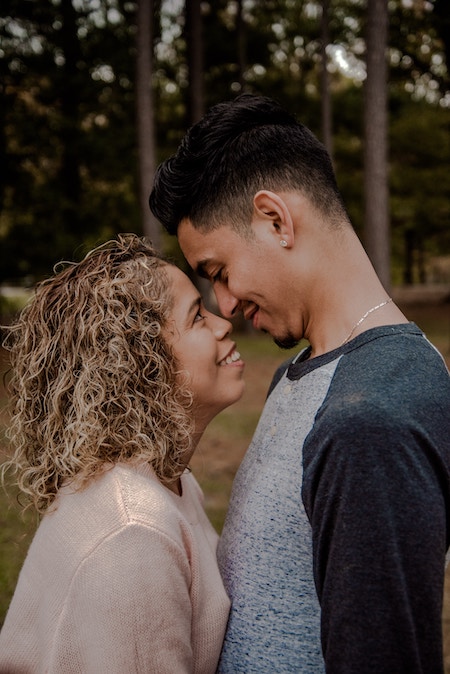Underneath so many of our marriage problems is an unconscious fear of intimacy?
‘But,’ you say, ‘I don’t have a fear of intimacy.’
Did I mention this fear is unconscious?
Could it be that all this extra time together is forcing you to confront your fear of intimacy?
Let’s not miss this opportunity! Let’s talk about how to identify and disarm the fear of intimacy that causes marriage problems.
According to Imago Relationship Theory, a universal human longing is to be in connection and at the same time feel safe.
The longing for intimacy is evident in the Romantic Stage of our relationship.
When we start out we want to know everything about our partner, and we want our partner to know everything about us.
During the Romantic Stage, information and energy flows into the relationship and it feels full and alive and exciting.
But soon, intimacy requires an openness and vulnerability we’ve never experienced.
That’s when we move into the Power Struggle Stage. The power struggle happens in part because we are unwilling to be open and vulnerable with our partner.
Deepening intimacy in a relationship takes us to an increasingly vulnerable place. That can be terrifying (that’s not too strong a word).
Because our brains are hardwired for survival, intimacy terrifies us.
I’m terrified that if I share a certain part of myself it will be rejected. So I avoid the opportunity for intimacy.
This fear comes from early childhood where we were wounded in our first experiences of connection. As good as the best parents are, wounding still happens to all of us to some degree.
In response to this wounding, we create certain character adaptations based on the unconscious triggered responses of fight, flight, freeze, or submit.
Then in our adult relationship, when we feel vulnerable, we use these same behaviors we learned in childhood to take ‘exits’ from the relationship.
We create ways to have a sense of ‘staying in connection’ without having to risk the danger or pain of real connection.
That’s when the movement of energy and information that made the relationship so full and alive and exciting starts to flow away from the relationship.
It’s also when you hear couples say things like, ‘We’re so busy with the kids, and work, and all our activities, we just don’t have time for each other any more.’
I don’t want to minimize stressors from the outside. There’s a reality there. Our relationship is an open system that is always being affected by outside forces.
But the real issue is not stress from the outside. It’s the fear of intimacy on the inside.
Although we long for intimate connection, the exits we take are a result of an unconscious collusion we create with our partner to actually avoid intimacy.
In Imago Relationship Theory we define collusion as ‘two people partnering together to create something that neither of them wants’.
What?! That doesn’t make any sense!
Well, consider my own example.
During this crisis my wife Sandy and I have discovered that we have ways of working together to maintain the illusion of closeness while at the same time keeping a comfortable distance in order to avoid intimacy.
We use our learned childhood attachment behaviors to be able to feel relatively safe.
I’ll get upset at Sandy, but I don’t want to talk about it. Sandy senses the tension, and also wants to avoid it. So we decide to watch a movie.
With the help of Netflix we can go into a state of mindlessness and never bring up the thing we need to talk about.
We give each other the experience like everything’s OK, because we now have a comfortable distance between us.
We long for a deeper sense of intimacy, but because we’re afraid…
We collude together to prevent ourselves from getting what we really want while giving ourselves what we really don’t want – a comfortable distance.
And what happens with that thing I need to talk about? Nothing. It’s stuffed where it will simmer. It stays there unresolved and it will continue to grow inside of me.
And things will get worse between us, unless we decide to deal with our fear of intimacy, close the exits, and find the deeper intimate connection we long for.
What about you? What are your exits?
Work? Netflix? Hobbies? The children? All exits rob your relationship. Some exits, like affairs or pornography are even more destructive.
So what do we do?
Let’s close the exits, be brave, make ourselves vulnerable and reconnect in deeper intimacy!
Imago Relationship Therapy has a wonderful tool that will help us do that. It’s called the Commitment Dialogue. Click on the link to print it out.
The Commitment Dialogue is used to identify and close ‘exits’, i.e. places where you are getting your needs met outside your relationship.
By closing exits you make more time and energy available for your relationship.
The Commitment Dialogue takes you through the Imago steps of Mirroring, Validating, and Empathizing which are essential to create safety where vulnerability can happen.
Then it ends with a commitment to talk your frustrations out rather than acting them out in ways that avoid intimacy and connection with your partner.

